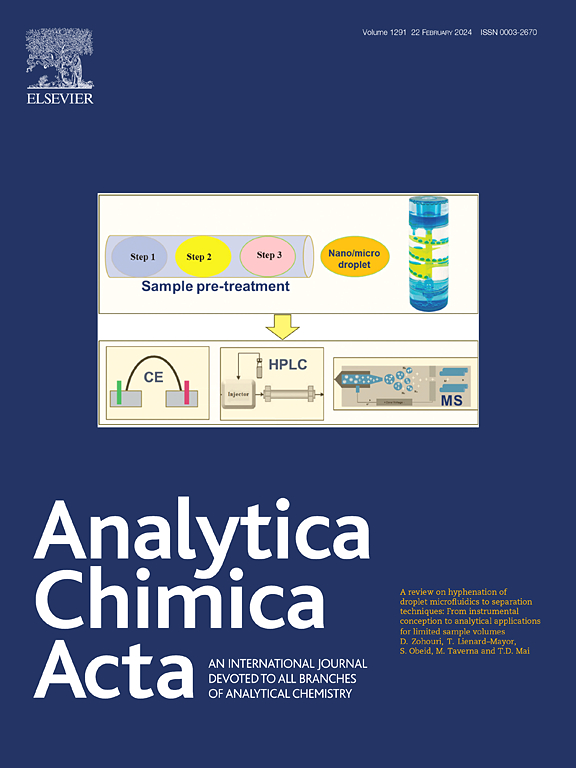Functionalized toothpicks for solid-phase microextraction of drugs from oral fluids
IF 5.7
2区 化学
Q1 CHEMISTRY, ANALYTICAL
引用次数: 0
Abstract
Background
Efficient extraction techniques with high selectivity and sensitivity are critical for drug analysis in biological matrices. Traditional methods often face challenges when dealing with semi-polar and ionic drugs, necessitating the development of improved sorbents. To address this issue, we propose the use of carboxymethylated wooden toothpicks (c-WTs) as a novel sorbent for solid-phase micro-extraction (SPME). This approach aims to improve drug extraction from oral fluids, offering a more effective and sustainable solution compared to conventional sorbents.
Results
Wooden toothpicks were modified through sodium chloroacetate oxidation under mild conditions, introducing carboxyl groups that enhance analyte-sorbent interactions via electrostatic forces. Characterization via infrared spectroscopy and scanning electron microscopy confirmed the successful derivatization, showing an increase in surface roughness compared to unmodified toothpicks. The optimized SPME method was applied to extract a range of 22 drugs, including amphetamines, opioids, benzodiazepines, and cannabinoids, from oral fluids. The validation of the method demonstrated excellent performance, with recovery rates ranging from 68 to 120 %. Precision was high, with relative standard deviations (RSD) below 10 %. The method also exhibited low limits of quantification (1–5 μg L−1) when analyzed by liquid chromatography-tandem mass spectrometry (LC-MS/MS), indicating its potential for reliable and sensitive drug analysis in biological matrices.
Significance
This study presents an innovative, sustainable approach for drug extraction using natural-based sorbents. The use of c-WTs offers a cost-effective, selective, and environmentally friendly alternative to traditional methods. This work contributes to the development of efficient SPME techniques for complex biological samples, advancing analytical methodologies in forensic and clinical applications.

固相微萃取口服液中药物的功能化牙签
高选择性和高灵敏度的高效提取技术是生物基质中药物分析的关键。传统方法在处理半极性和离子型药物时经常面临挑战,因此需要开发改进的吸附剂。为了解决这一问题,我们提出使用羧甲基化木牙签作为固相微萃取(SPME)的新型吸附剂。这种方法旨在改善从口服液中提取药物,与传统吸附剂相比,提供更有效和可持续的解决方案。结果在温和条件下通过氯乙酸钠氧化改性木质牙签,引入羧基,通过静电力增强分析物与吸附剂的相互作用。通过红外光谱和扫描电子显微镜的表征证实了衍生化的成功,表明与未经改性的牙签相比,表面粗糙度有所增加。采用优化后的SPME提取方法,从口腔液体中提取安非他明、阿片类药物、苯二氮卓类药物和大麻素等22种药物。结果表明,该方法的回收率为68% ~ 120%。精密度高,相对标准偏差(RSD)小于10%。液相色谱-串联质谱(LC-MS/MS)分析的定量限较低(1 ~ 5 μg -1),表明该方法具有可靠、灵敏的生物基质药物分析潜力。本研究提出了一种利用天然吸附剂提取药物的创新、可持续的方法。c-WTs的使用为传统方法提供了一种具有成本效益、选择性和环保的替代方案。这项工作有助于开发复杂生物样品的高效SPME技术,推进法医和临床应用的分析方法。
本文章由计算机程序翻译,如有差异,请以英文原文为准。
求助全文
约1分钟内获得全文
求助全文
来源期刊

Analytica Chimica Acta
化学-分析化学
CiteScore
10.40
自引率
6.50%
发文量
1081
审稿时长
38 days
期刊介绍:
Analytica Chimica Acta has an open access mirror journal Analytica Chimica Acta: X, sharing the same aims and scope, editorial team, submission system and rigorous peer review.
Analytica Chimica Acta provides a forum for the rapid publication of original research, and critical, comprehensive reviews dealing with all aspects of fundamental and applied modern analytical chemistry. The journal welcomes the submission of research papers which report studies concerning the development of new and significant analytical methodologies. In determining the suitability of submitted articles for publication, particular scrutiny will be placed on the degree of novelty and impact of the research and the extent to which it adds to the existing body of knowledge in analytical chemistry.
 求助内容:
求助内容: 应助结果提醒方式:
应助结果提醒方式:


